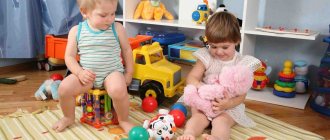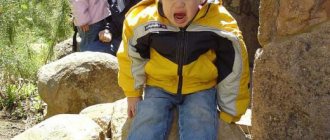At the age of 1 to 2 years, a child gets acquainted with the world, takes his first steps in it, learns to speak, and acquires his first skills.
The period from 1 to 2 years is divided into two stages:
- from a year to a year and a half. At this stage, the child, starting to walk, becomes more independent than before. He begins to explore everything and climb everywhere, he earns bumps and scratches at great speed. At this time the child begins to speak.
- from one and a half to two years. The child improves the skills he acquired earlier. It determines its place in the environment. You can already clearly trace the manifestations of his character.
You need to pay special attention to these divisions. Based on them, you can choose the right scheme for caring and raising your child.
Scientists have established that in the first three years of life, a child receives 90% of all information about the world around him, and he acquires the remaining 10% throughout his subsequent life. Therefore, it is necessary to bring the child’s knowledge about this world as best and correctly as possible.
Understanding the world around us
During this period, the child is very active and is interested in everything. He does not waste a minute to understand the world; as soon as he opens his eyes, he begins a new study. And you don’t need to interfere with him in this. Don't yell at your child if he does something wrong or interferes where he shouldn't. You can calmly explain everything to him, what can be done and what cannot be done. Help your child explore the world around him. If he pulls drawers out of the table, do the same, but pull them out with him, examining their contents, explaining what is intended for what. If your child climbs into a closet, climb into it with him. Do all this in game mode; it is in games that the child develops better. If a child takes things that are not very suitable for games: plates, a hammer, a wallet, do not rush to take it away from him, giving him a better understanding of the adaptation of each thing. The more objects a baby gets into his hands, the faster he acquires skills. Teach your child to handle your book carefully by showing how to turn the pages. Give him any toy and show him how to put it in the box correctly, and then ask him to repeat after you. And the baby will certainly delight you with his new skill. Think about what skills you could develop in your child.
Makoto Shichida Early Development Methodology
Makoto Shichida is a Japanese professor, scientist, researcher and practitioner in the field of brain activity. Shichida considered children to be natural geniuses and did not advise parents to get involved in academic studies. In his opinion, the task of adults is to create a favorable environment for the development of the child’s brain.
Basic principles of the methodology:
- The priority in Shichida’s method is the development of the right hemisphere of the child’s brain, which is responsible for intuition and the subconscious. This is precisely the main difference between this method and the traditional, “left-hemisphere” method used in most modern kindergartens and schools. Shichida considered the age from six months to 6 years to be ideal for the development of the right hemisphere.
- The benevolence of parents and a positive attitude determine the success of classes.
- Activities with the child should be varied and aimed at developing all the child’s abilities: photographic memory, visualization, mathematical abilities, musicality, intuition and even extrasensory perception. Shichida recommends using a large number of cards with a variety of images, tangrams, puzzles, books, listening to music with your child, doing creative tasks and much more. Source - lovingmama.ru
Vocabulary accumulation
After one year, the child begins to pronounce new words each time. He does not speak the entire phrase, but you already know what he wants to say. During this period, the child remembers words very well and quickly. Engage with your child as much as possible. Explain the purpose of each object and thing, accompany it and your actions with your comments. Ask your child to repeat after you if you are explaining something new to him. By imbuing your child with knowledge from early childhood, you make his life easier in the future. Try to talk to your child as much as possible, teaching him how to construct phrases and sentences.
Masaru Ibuka technique
Masaru Ibuka is a Japanese engineer and successful businessman, one of the founders. However, he gained fame to a greater extent as the author of a unique method of early development, which combines recommendations regarding all aspects of a child’s life. Masaru Ibuka's only son, who suffered from autism, inspired him to study in detail a variety of pedagogical techniques and constantly observe children and adolescents. The result of the research was a provocative conclusion, which became the title of a famous book - “After Three It’s Too Late”
Masaru Ibuka was convinced that in the first three years of life a child’s mental abilities are formed, which means it is important for parents not to miss this “golden time” for educating their child
Basic principles of the methodology:
The first three years of a child’s life are the foundation for his entire future.
Therefore, it is important to provide the baby with a favorable environment, constantly communicate with him, show affection and care, develop him intellectually and physically, aesthetically and musically. The environment is more important in terms of a child’s development than genes. It is impossible to “overfeed” a child with new knowledge; his nervous system blocks information when the brain is full of it. It is necessary to introduce a child to real art by showing him reproductions of paintings by great artists and letting him listen to the music of classical composers. A child should not have many toys, this distracts attention and suppresses development. Strictness towards a child should be shown in the first years of his life, and not vice versa. After 2-3 years, the child develops self-esteem, and excessive pressure only causes protest and disobedience. Young children can and should be taught foreign languages. Parents should encourage their child's creative expressions. Children need to constantly move. Motor skills need to be trained from infancy.
Walking is very beneficial because it uses most of the muscles in the body.
Child falls
In addition to learning about the world, after one year a child quickly learns the wisdom of walking. And, of course, he falls often. You don't have to rush to his aid every time. The child must learn to overcome difficulties on his own. Otherwise, in the future he will always be looking over his shoulder, waiting for your help. Don't worry about your baby falling too much. This is par for the course. He is not in danger of any fractures, because his weight is too small, and his bones contain a lot of organic matter and are very flexible. The only thing you should do is support your child with your words. Calm the baby down if he gets nervous, encourage him. Don't be coy with your child - this may have a bad effect in the future. Talk to him like an adult.
Recommendations for parents
Be patient and allow your child to be independent if it is safe to do so. Adhere to a democratic parenting style - encourage initiative, take into account needs, help. You should not repeat the words he invented after your child, otherwise it will take him longer to learn to speak normally.
The strength and severity of a child’s negative reactions during an age crisis depend on the family situation. Inconsistent parenting style increases affective displays.
The essence of the crisis of the first year is the contradiction between the desire for independence and dependence on adults. The main qualitative transformation of this period is the child’s orientation towards the adult’s assessment.
Child learns to eat independently
After one year, the child should be able to handle a spoon independently. If not, work on it. Some children are able to eat with a spoon before they are one year old. You don’t need to do anything special for your child to learn to eat on his own. If a child grabs a spoon and starts playing with it, do not forbid him to do this, let him get used to it and study it. If a child gets very dirty in porridge, do not scold him for it. Soon he will learn to do everything right. If a child often indulges at the table and is distracted from eating, he can be easily weaned off this. Every time he starts misbehaving again, just take the plate of food and hide it somewhere. Over time, the child will understand that pampering at the table will not lead to anything good.
Language of emotions
In general, small children, even those who can speak, do not speak in words, but in the language of behavior and the language of their emotional states . Those. A child’s behavior, even the most bad and unpleasant behavior for you, even terrible behavior in public, including screaming, must first of all be treated as a language. This is a language without words, and parents should learn to understand: what does the child want to tell them with this cry?
But parents are also living people, and the cry of a child, especially his own, especially in public, involves a very strong primary reaction in the parents. This reaction consists of the desire to remove the source of sound by any means. Here everyone forgets about educational guidelines, about what they read in books, listened to in lectures, what they promised themselves before. The reaction to a scream is primary, coming from the depths. Shut up and that's it.
One might say that this reaction is immature. If you don’t learn to somehow extinguish it in yourself, to slow it down, then you won’t be able to overcome the scream. A child is yelling or being capricious—behaving badly. Mom gets angry and also yells - and this is a vicious circle that an adult must break.
Games in the water
From one to one and a half years old, babies begin to love water. They splash in the water with pleasure and laugh, which gives them great pleasure. Now the child is drawn to water. Encourage your child to play in warm water more often. Give him toys and a couple of plastic cups. Do not pour a lot of water into the basin, and let the baby splash and pour water from one vessel to another. It is better to buy an inflatable pool with fish for your child. He will not be able to turn it over when sitting on the edge, unlike a basin.
How does a baby feel during childbirth?
In the womb, the child was very comfortable and familiar, he heard the sounds of conversations of his loved ones, was in a warm place and observed the uniform beats of his mother’s heart. For 9 long months life was monotonous and comfortable.
Contractions begin abruptly, the baby is squeezing, and oxygen levels drop. Its head is then pulled through its mother's pelvis, where it becomes slightly deformed.
As soon as he is born, the temperature drops sharply from 37 degrees to 20.
All the time the baby was floating in a liquid that made it impossible to feel his weight, but now everything is different - he feels what an astronaut does when he descends to the ground - his real weight, which makes him very scared. The worries and fear go away when the mother presses him to her heart again!
Sandbox games
At the age of 1 to 1.5 years, the child also loves to play in the sand. But sandboxes in the city are not always clean. They are mostly filled with garbage, dust and other objects. If you have the opportunity, make a sandbox for your child in your yard or summer cottage and fill it with clean yellow sand. After all, a child’s addiction to sand will remain for a long time. Give your child a plastic bucket, a shovel, animal figurines, let him sculpt figurines out of sand, build houses, and you can help him with this.
Features of education
Features of the development and upbringing of children of 1 year of age practically do not differ by gender. But two-year-olds should have differences. It is important to raise a two-year-old boy to be strong and courageous, but not at the expense of alienating feelings.
You must show your loving and caring attitude: talk, kiss, stroke. By the age of two, boys are very active, often getting bruises and bumps, but this is not a reason to limit physical training.
Raising a two-year-old girl is focused on developing creative abilities. The aesthetic side is more important to them.
Give her compliments, only sincerely, without falsehood.
We purchase toys according to age
Your child plays such games and with such toys to which he has grown and matured internally. And you need to remember this when buying toys for him again. If you buy a child aged 1.5-2 years a set of felt-tip pens and a sketchbook, you will not benefit from it for him. After all, most likely he will paint the entire album and walls. He rips out the pages from the album, scatters markers all over the house and runs around. And you will only be upset; it is better to hide it all and wait for the right moment when the child is old enough for this.
Your child is talking
At the age of one and a half years, you can expect the first phrases from the child. The clearer and more you talk to him, the faster your child will learn to speak and form phrases on his own. When talking to a child, avoid gesticulation and do not distort words. Don't copy your child's language ineptitude. Don't imitate or make fun of him. If your child is a little behind his peers in speech, don’t worry, he will soon catch up. The main thing is to do more with your baby, communicate more and everything will be fine.
Physiological changes
Starting from one year of age, the growth rate will slow down slightly. This is completely normal: only in the first 12 months of life the baby grows so rapidly, then the process will become a little less rapid.
Weight loss.
Strictly speaking, weight itself does not decrease - only the rate at which it increases. The baby plumpness is gradually starting to go away, but some of it still remains. Over time, the baby will gain weight more slowly, and this indicates his normal development.
Teeth.
At the age of one year, a baby already has several teeth erupting - on average up to 8. It is worth showing the child to the doctor if he has not developed a single baby tooth in one year. When they cut, the baby becomes restless and often has trouble sleeping at night: he feels uncomfortable and this makes it difficult to sleep. Doctors give recommendations on how to reduce discomfort for a child during teething.
Feet.
The baby’s teeth are still flat and no bend has appeared on them. This will pass over time when the child gets used to walking on his own, and then the fat pads on the feet will disappear. If the baby has already begun to actively walk, the pads may disappear earlier, and a healthy bend will begin to appear on the legs. The doctor will examine the baby’s legs during a routine check-up, and he will tell you if everything is fine with them.








